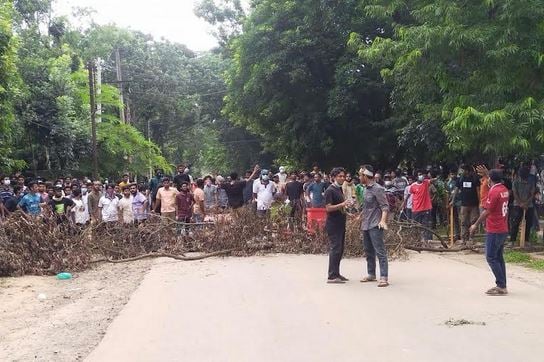News Flash
News Flash

JAHANGIRNAGAR UNIVERSITY, July 17, 2025 (BSS) - On July 17, 2024, the peaceful Jahangirnagar University (JU) campus plunged into unrest and violence a day now remembered by students and teachers as a dark chapter in the university's history.
On that morning, following a directive from the University Grants Commission (UGC), the JU authorities convened an emergency syndicate meeting at 10:00 am in the new administrative building.
Amid growing fears that the administration might decide to vacate student dormitories, a group of teachers under the banner of 'Shikkhok Oikya Parishad' attempted to meet with then Vice-Chancellor Prof Nurul Alam.
Current JU Vice Chancellor Prof Dr Mohammad Kamrul Ahsan was one of them. "We requested them not to vacate the halls and to keep academic activities running. We also directly urged them not to take such a harsh decision," said Prof Kamrul.
Outside, students anxiously waited for the outcome. Among them was Mohammad Shahin Rana, a postgraduate student of the Public Administration Department, who stood with others in front of the administrative building, fearing of hall vacate decision.
Their fears came true when the university's former Registrar Abu Hasan announced that the syndicate had ordered all residential students to vacate the halls by 4:00 pm, citing security concerns.
The announcement sparked immediate outrage. Students rejected the decision, accusing the administration of using security as a pretext to suppress the ongoing quota reform movement. The crowd outside the administrative building swelled as tensions escalated.
At the same time, Border Guard Bangladesh (BGB) and police personnel were seen stationed on the Dhaka-Aricha Highway, near the university's main entrance, alongside an executive magistrate's vehicle.
Minutes later, police entered the campus with an Armoured Personnel Carrier (APC) reportedly at the administration's request.
By 1:00 pm, more than two hundred students had taken position on the street near Murad Yard, intensifying the standoff and setting the stage for a day of violent confrontation.
Prof Mafruhi Sattar of the Pharmacy Department was among the teachers who tried to contact the vice-chancellor in hopes of preventing a police crackdown.
"I, along with several teachers, tried to meet the VC to explain that the situation was under control and students were not threatening anyone. But we couldn't reach him, as the office gates were locked and no one from the administration answered our calls," said Prof Mafruhi, terming the VC's claim of being trapped inside his office 'a complete lie.'
Md Shakil Islam, a postgraduate history student who sustained pellet injuries during the police action, echoed the same.
"There was no situation that warranted police intervention. We later realized they were called in to crack down on us without any valid reason," said Shakil.
As news of the vacate order and police entry spread, students from different halls erupted in protest and gathered at various points across the campus.
Journalists covering the incident also faced serious hurdles while performing their professional duties.
Abdullah Al Mamun, a postgraduate student of Journalism and Media Studies and the university correspondent for Prothom Alo, sustained injuries to his head, neck, and hands while covering the clashes.
"Police even obstructed an ambulance carrying students injured by gunfire from the Physics Building area to the university's medical centre. Despite showing my press identity card, a policeman struck me with a baton. When I tried to flee, the officer fired a rubber bullet at me in the Murad Chattar area of the university," said Mamun.
Md Nasir Uddin Sikdar, former office secretary of JUJA, shared his experience while leaving the campus through the main entrance.
"There were rumors of a possible attack. Most students had already left the campus, feeling unsafe at night. As we were leaving, we saw a large number of law enforcers surrounding the main gate area," said Nasir.
Arifuzzaman Uzzal, former president of the JU Journalists' Association (JUJA), described the police movement strategy under the direct supervision of former Additional Superintendent of Police (Savar Circle) Abdullah Hel Kafi, including the then officer-in-charge of Ashulia and Savar Police Station.
"Police divided into three groups one moved towards the Wazed Miah Research Centre, another from the Registrar Building to AFM Kamal Uddin Hall, and the third entered from Prantik Gate heading towards Al Beruni Extension," said Uzzal.
Amid the tense standoff, some teachers extended support to the students.
Prof Dr Shamima Sultana of the Bangla Department, known for her bold role during the July Uprising, was among them.
"I allowed protesting students to access my department's chairman's room and even my personal room with the help of a staff member," said Prof Shamima, recalling her efforts to provide shelter during the crackdown.
Meanwhile, JU VC Prof Kamrul Ahsan told BSS that a committee had been formed to examine whether the syndicate's decision on July 17, 2024, to vacate the halls and close the campus was formally adopted following the rules.